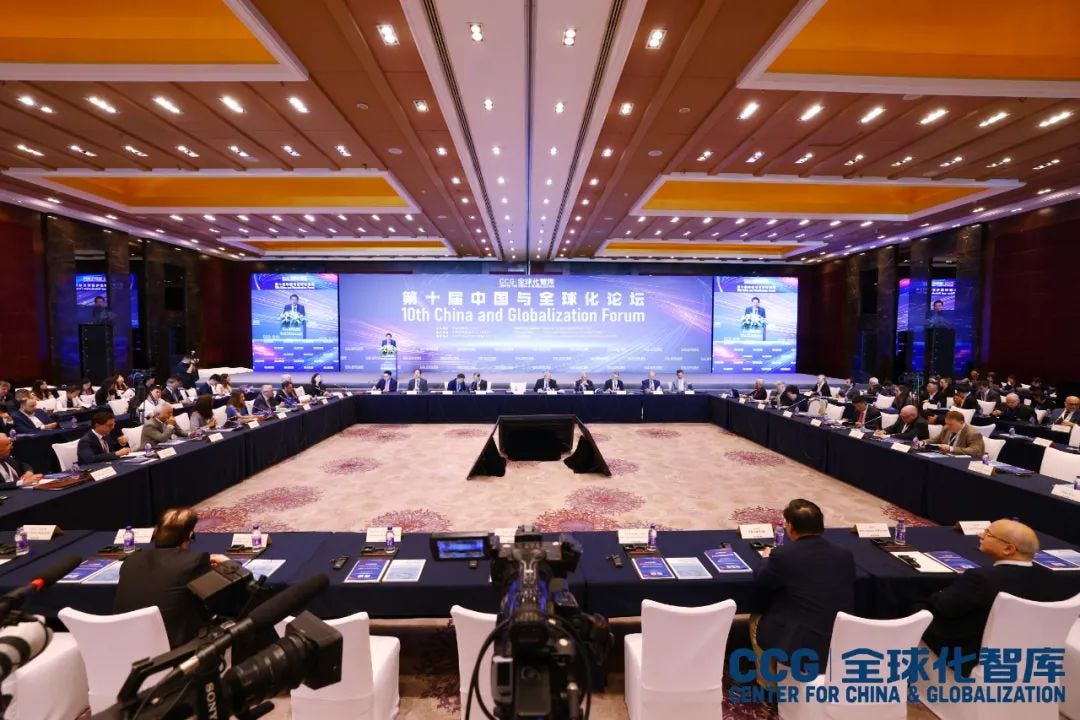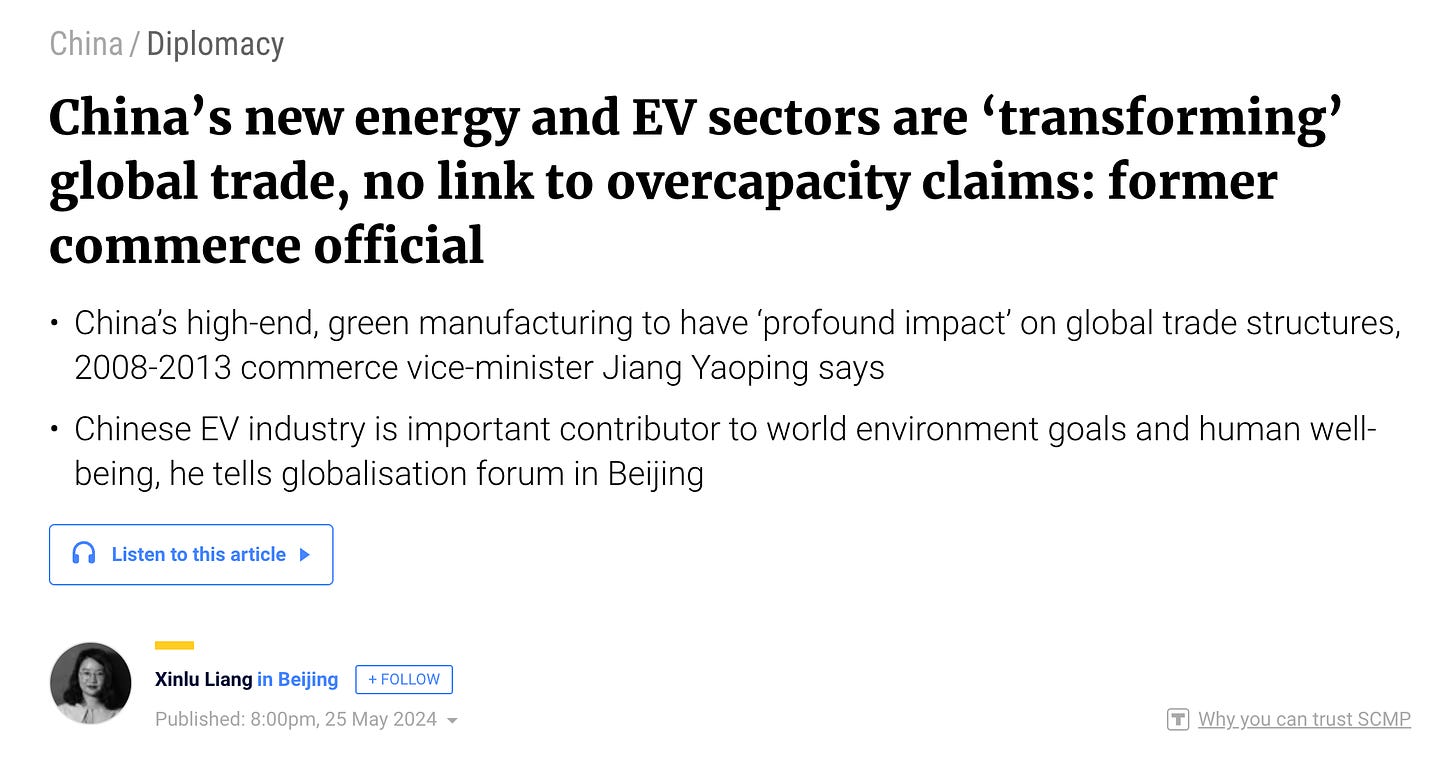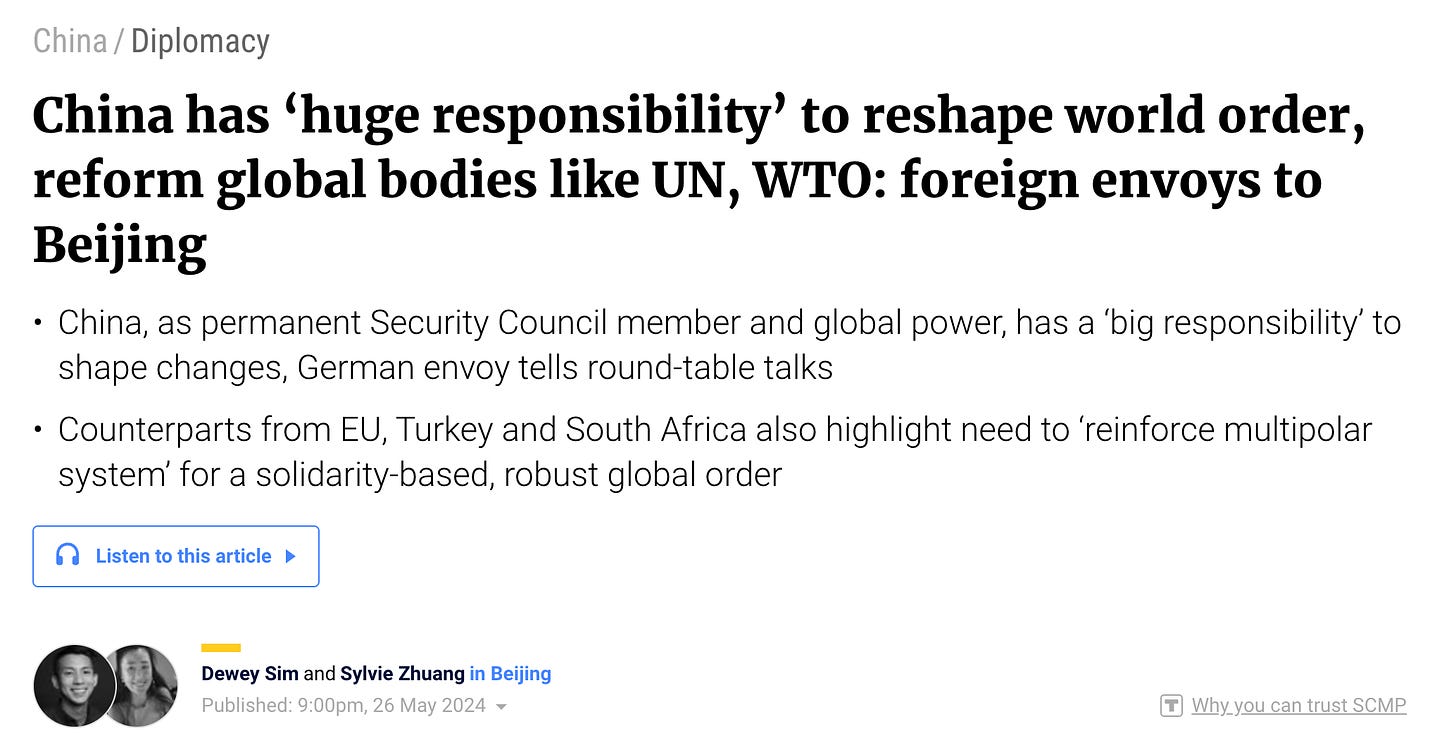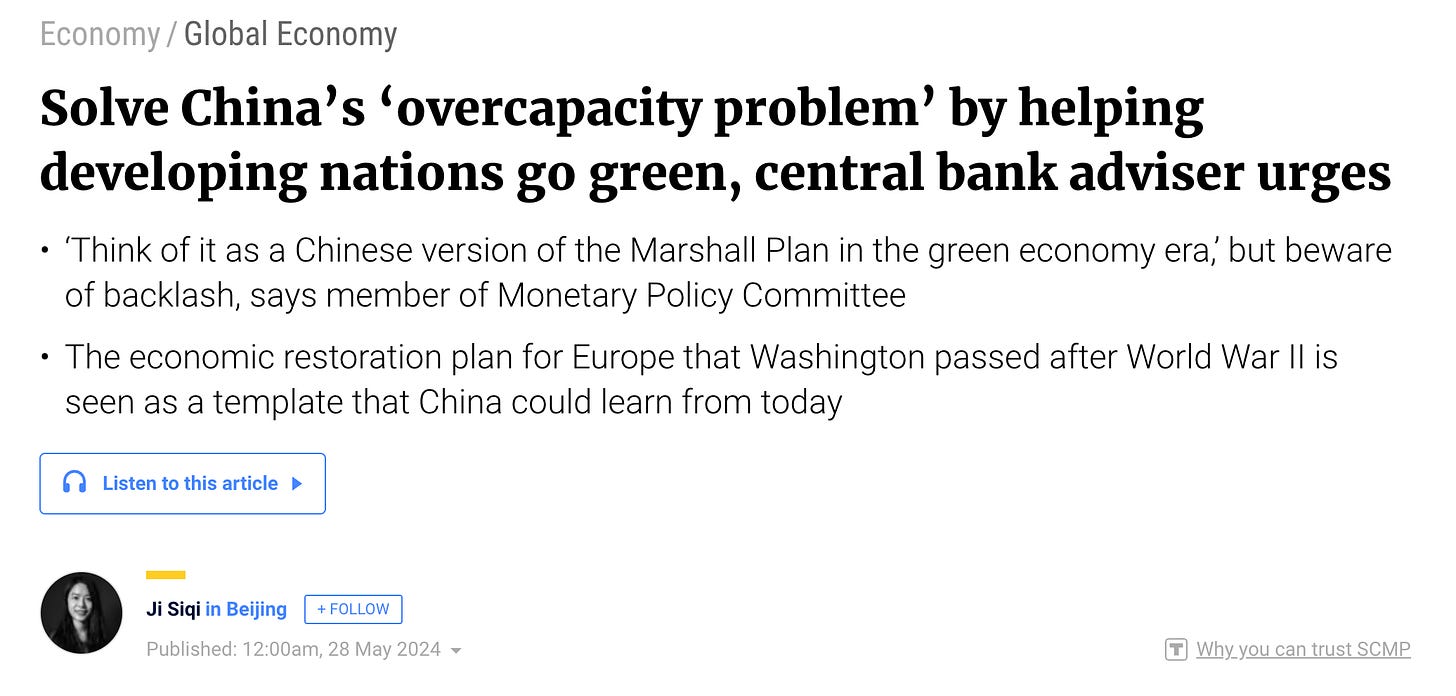SCMP reports on 10th China and Globalization forum
Three reports from last weekend's forum focusing on the future of globalization and China’s strategic role
On May 25th and 26th, 2024, the 10th China and Globalization Forum, hosted by the Center for China and Globalization (CCG), co-organized by the China-United States Exchange Foundation (CUSEF), and supported by the Academy of Contemporary China and World Studies (ACCWS), took place in Beijing. This year's forum attracted nearly 300 guests from over 50 countries.
The forum has attracted coverage from domestic media outlets such as China Daily, CGTN, China.com, Economic Daily, Beijing Daily, and 21st Century Business Herald. CCG has also broadcasted the video recordings of the open-door sessions via social media platforms in China, including Weibo, Baidu, Kuaishou, Douyin, Caijing, and WeChat. The video recordings will be posted to YouTube shortly.
We are currently transcribing the video content, which will be released gradually, making the forum's insights accessible both domestically and internationally.
As of today, the South China Morning Post has produced three reports based on the outcomes of the forum. The CCG Update is pleased to repost them here in chronological order.
The first article written by Xinlu Liang, was published online on May 25th and appeared in the print edition under the title “EV and new energy sectors ‘transforming’ global trade,” on May 26th.
China’s new energy and EV sectors are ‘transforming’ global trade, no link to overcapacity claims: former commerce official
China’s high-end, green manufacturing to have ‘profound impact’ on global trade structures, 2008-2013 commerce vice-minister Jiang Yaoping says
Chinese EV industry is important contributor to world environment goals and human well-being, he tells globalisation forum in Beijing
A former senior economic official has hailed China’s new energy sector for its “transformative” effect on world trade and the environment, while dismissing accusations of overcapacity clearance.
Jiang Yaoping, who served as China’s commerce vice-minister from 2008 to 2013, said the country’s growing manufacturing heft had shifted the centre of global trade, not only changing its traditional patterns but also significantly boosting the status of emerging markets and developing economies.
“Notably, China has become the world’s largest automotive exporter,” Jiang told the 10th annual forum of the Centre for China and Globalisation (CCG) think tank in Beijing on Saturday.
“The development of new energy vehicles in China is by no means positioned as a solution to ‘domestic overcapacity’,” he said, arguing that the Chinese electric vehicle (EV) industry represented the future direction of the global vehicle sector and was an important contributor to global environment goals and human well-being.
“China’s manufacturing is moving towards high-end, intelligent, and green development, and is upgrading the industry chain, supply chain and value chain. This will have a profound impact on the upgrading of global trade structures and the transformation of the global trade landscape,” Jiang told ambassadors and economists from around the world gathered at the forum to discuss the decline of globalisation.
Allegations of overcapacity have become a contentious issue in China’s escalating economic rivalry with the United States and Europe.
The European Union says that generous subsidies to China’s hi-tech and green industries have created an oversupply of goods that are then exported at a lower cost, threatening the EU’s domestic market, and compromising fair trade and competition.
The EU launched an investigation last year into Chinese EV subsidies, the results of which are imminent and expected to hit all made-in-China EVs with extra import duties of around 20 per cent.
Earlier this month, Washington announced it would raise tariffs substantially on a wide range of Chinese goods, including EVs, solar panels and lithium-ion batteries, also claiming unfair trade practices and state subsidies.
Academics and officials at the Beijing forum warned of several factors dialling back globalisation, as they called for increased cooperation across nations.
Jiang said improving the global trade landscape would require countries to coordinate on policies, optimise trade structures, promote digitalisation and green development of trade, formulate multilateral trade rules, cultivate talent and strengthen cultural exchanges.
According to Wang Liyong, director of the government-affiliated China Centre for Contemporary World Studies, counter-globalisation has become the main development trend and is likely to remain so for a long time.
“First, there is a growing polarisation in policies on globalisation, with some people advocating for protectionism and isolationism. And more harmful is the emergence of a mentality that views international relations as a zero-sum game, where one country’s gain is another’s loss,” Wang told the forum.
“This mentality can lead to the demonisation of other countries, perceiving them as threats or enemies. The current consequences of international relations are likely to be the creation of nationalistic sentiments, propaganda conflicts, and even wars.”
Wang’s views were echoed by Declan Kelleher, chair of the governing board at the European Policy Centre, a Brussels think tank, and a former Irish ambassador to China and the EU.
“2024 is a year of change, and a year of crossroads [for the EU amid] turbulent geopolitical waters,” Kelleher said, referring to the Ukraine war and the November US presidential elections that could have serious implications for the bloc.
The administration of former US president Donald Trump “seriously obstructed” the World Trade Organization “from doing its business”, he said.
“I think that’s something that has to be looked at, we have to look at really empowering the WTO. The WTO has many defects, but it’s still the basis of international trade law.”
Regarding the Ukraine war, there is unease in Europe about China’s stance, particularly its failure to publicly condemn Russia’s invasion of the former Soviet state despite pressure from the West and the United Nations.
Europe has also long drawn criticism from Beijing over following the US in its strategy to contain China. Speaking of strategic autonomy, which the EU has emphasised in its moves to “de-risk” China ties, Kelleher clarified that it did not mean opposing or supporting the autonomy of any particular country. “It simply means that EU decisions must be made by the EU, not automatically following any other country.”
Ferdinando Nelli Feroci, Italy’s former permanent representative to the EU, said the bloc was facing a lot of challenges in maintaining globalisation, including the war in Ukraine and its impact on international relations.
“We were also forced to adopt a number of measures that went into exactly the opposite direction of globalisation,” he said.
“We were forced to impose sanctions on Russia, we were forced to reduce drastically to the purchase of fossil fuels from Russia, we were forced to diversify our sources of supply for fossil energy sources and we would have expected a better solidarity from the rest of the world in dealing with that conflict.”
Nelli Feroci also emphasised the need for a more credible and effective system of international relations to address the challenges, including war, climate change, and food and global health security.
David Blair, former economics department chair at the Eisenhower School under Washington’s National Defence University, said the world was at an inflection point, where a new type of great power relation was being established and the old system, characterised by US-led globalisation, was no longer viable.
Blair, who is vice-president and senior economist at the CCG, also emphasised the importance of people-to-people relationships.
“The best way I see forward is let’s have as much contact as we can between people. So at least there’s that level of understanding. And maybe we can build on that to try to create a more peaceful, sustainable, globalised world,” he said.
Danny Quah, dean of the National University of Singapore’s Lee Kuan Yew School of Public Policy, suggested that “third nations” – or the Global South – could play a crucial role in easing great power cooperation while avoiding Orientalist approaches that reinforce power imbalances.
Nations must cooperate multilaterally to address these issues, avoiding zero-sum confrontations, he argued, because “the world has now as a consequence of these dynamics moved away from a productive globalisation to a world where there is securitisation and weaponisation of economics”.
The second article by Dewey Sim and Sylvie Zhuang was published online on May 26th and in the print edition under the title “Beijing urged to help make world order ‘fit for purpose’” on May 27th.
China has ‘huge responsibility’ to reshape world order, reform global bodies like UN, WTO: foreign envoys to Beijing
China, as permanent Security Council member and global power, has a ‘big responsibility’ to shape changes, German envoy tells round-table talks
Counterparts from EU, Turkey and South Africa also highlight need to ‘reinforce multipolar system’ for a solidarity-based, robust global order
China has a “huge responsibility” to shape the future world order, as cracks in existing international systems reveal a dire need for reforms, envoys to Beijing told a multilateral forum on Sunday.
The German ambassador to China, Patricia Flor, said a “more efficient multilateral system” was needed to tackle the multiple crises facing the world, including climate change, the Ukraine war and the weakening of human and women’s rights.
Addressing these challenges would require greater cooperation and integration between countries, and a “peaceful adaptation” of global institutions, from the World Trade Organization to the UN, Flor said at the annual forum of the Centre for China and Globalisation (CCG), a Beijing-based think tank.
“The way should be to look at a reform that makes our global order fit for purpose, for the tasks and the challenges that we confront,” she said.
“We need to address some of the inefficiencies [of current global frameworks],” Flor added, citing how the UN Security Council was “less able to act” in a time of heightened geopolitical tensions and crisis.
The war in Ukraine has revealed cracks in the Security Council, which has repeatedly failed to act swiftly and fulfil its responsibility of maintaining international peace and stability.
To that end, China – as a global power and a permanent member of the UN Security Council – had a “really big responsibility” to shape future changes, Flor said.
“Whatever China does matters for the multilateral order as a whole and for our ability to steer reforms in the multilateral system, because the more we have conflicts with China and among us, the weaker our ability to collectively address some of these issues.”
Flor was among ambassadors to China who had gathered for a round-table talk on multilateralism as part of the annual CCG forum in Beijing.
Her views were echoed by Turkish ambassador Ismail Hakki Musa, who said China had a “huge responsibility” to drive reforms of international institutions, which he described as “not representative at all”.
While the existing liberal international order may have prevented a third world war, it had “fallen short of offering sustainable peace and security for all”, he said, adding: “Current global governance mechanisms are unable to address global challenges timely, fairly and effectively.”
Calling for a robust global system based on solidarity rather than polarity, Musa noted that Turkey had continued to call for a reform of the United Nations and other multilateral institutions to create a “just and fair new order”.
Calls for UN reform, particularly for restructuring the Security Council, have grown louder in recent years. The council’s five permanent members – Britain, China, France, Russia and the United States – represent the victors of World War II, and countries including Brazil, Germany, India and Japan have been pushing to join them.
The political, economic, environmental and technological challenges facing the international system indicated the “pressing necessity and inevitability” of a transformation, Musa told the forum, also attended by envoys from New Zealand, Argentina and Estonia.
“I think we almost agree on some inefficiencies of the current system. Let’s not wait for a major conflict in order to reform it,” he said, pointing out that new systems were previously established after such conflicts.
Jorge Toledo, the European Union envoy, also voiced similar sentiments, saying the world was moving “from globalisation to fragmentation”.
“That’s why we need to reinforce our multipolar system,” he said.
“A very simple way” to do that would be to reinforce, align, and insist on the basic principles of the UN Charter, Toledo said, adding that these should be applied universally, as a compromise would lead to fragmentation and conflict.
“China, as a permanent member of the UN Security Council, has a special responsibility to protect the basic rules, the basic principles of the charter,” he said.
According to Siyabonga Cwele, the South African ambassador to China, the existing world order is facing challenges like growing unilateralism, geopolitical rivalries, and “at some times blatant violation of international law and application of double standards”.
The result, he said, was a steady erosion of trust between countries that had weakened the ability of the international community to address shared challenges.
While the UN had made significant contributions to issues like poverty and human rights, it must be modernised to be more effective and inclusive, Cwele said.
“We believe that multilateralism, which is the notion of collective solutions, must be at the heart of the engagement between member states … guided by the UN Charter,” he said. “New momentum and political will is then required to strengthen and transform multilateral relations.”
The third article, published on May 28th both online and in the print edition, was written by Ji Siqi. The title for the print edition is “China ‘can share the burden’ of going green.”
Solve China’s ‘overcapacity problem’ by helping developing nations go green, central bank adviser urges
‘Think of it as a Chinese version of the Marshall Plan in the green economy era,’ but beware of backlash, says member of Monetary Policy Committee
The economic restoration plan for Europe that Washington passed after World War II is seen as a template that China could learn from today
To help developing countries expedite their green transition while simultaneously digesting China’s industrial overcapacity and enhancing the internationalisation of its financial sector, Beijing should take a page from the US’ old foreign-aid initiative known as the Marshall Plan, according to a central bank adviser.
Huang Yiping, a member of the Monetary Policy Committee of the People’s Bank of China, said on Monday that China could lend to emerging economies that are in need of a transition to clean energy but lack money and technology.
“Since every country needs to make the green transition, and developing countries find it particularly difficult, if we share the burden, we cannot only help them achieve the goal, but also elevate China’s global leadership and influence in green development,” Huang said at the Global Finance Forum organised by Tsinghua University in the city of Hangzhou.
While China’s overcapacity issue – caused by systematic excessive investment coupled with insufficient demand – is unlikely to abate in the short term, exporting the abundant fruits of its green energy sector is the only way out, said Huang, who is also dean of the National School of Development at Peking University.
“There has been obvious resistance in the European and US markets, but at the same time we actually have huge potential in developing countries,” Huang said.
In recent months, a number of Western countries have escalated their responses to a surfeit of Chinese imports in the new-energy sector, claiming that their own markets have become distorted and their manufacturing disrupted.
Two weeks ago, the United States announced steep tariff increases on an array of Chinese imports, including electric vehicles (EVs), lithium-ion batteries and solar panels.
And in October, the European Union launched anti-subsidy investigations into Chinese EVs to determine whether to impose punitive tariffs.
Developing countries need renewable-energy investments of about US$1.7 trillion annually – a far cry from the US$544 billion worth of foreign direct investment in clean energy that they attracted in 2022, according to a report last year from the United Nations Conference on Trade and Development.
It is possible that Beijing could provide them with policy financial tools through sovereign credit, or even direct funding, Huang added.
“We have the technology and the products … You can think of it as a Chinese version of the Marshall Plan in the green economy era,” he said.
Washington’s Economic Recovery Act of 1948, proposed by US Secretary of State George Marshall, was an initiative that provided billions of dollars worth of capital and materials to restore the economic infrastructure of post-war Europe.
“If [China’s version] works, we would be able to encourage them to buy more clean energy products from China and assist Chinese companies’ quest to go overseas, which in some degree could alleviate the overcapacity problem,” Huang said.
And as the US has done over the past century, China could also help promote the internationalisation of its currency and financial institutions by boosting the flow of the yuan in the process, he added.
Still, such a proposal could trigger backlash abroad, Huang acknowledged, as some Western countries have already criticised the Chinese government for creating a “debt trap” through lending via the Belt and Road Initiative to some developing countries to build large infrastructure projects – an allegation that Beijing denies.
Thus, Chinese financial institutions should act more prudently in commercial lending, while the government could also strive to reach agreements with international organisations on jointly helping resolve debt difficulties in these economies once they occur, he said.







